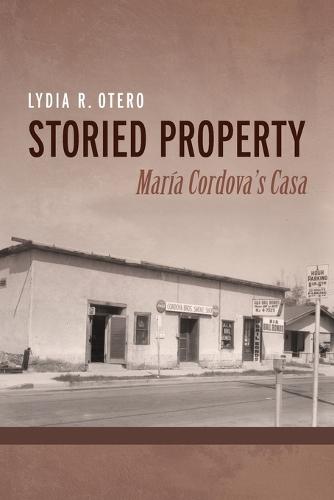Overview
RECLAIMING A LOCAL STORY AND THE WOMAN THAT HISTORY CAST ASIDE In the heart of downtown Tucson, Arizona, stands La Casa Cordova, an adobe structure located in the Tucson Museum of Art's Historic Block. Often described as the oldest building in the city, its story is far more complicated than timelines suggest. In Storied Property: María Cordova's Casa, historian and memoirist Lydia R. Otero uncovers the layered history of a home that once belonged to María Navarrete Cordova (1895-1975), who considered herself the rightful heir and authority over the house and the surrounding area's history. Located within the original boundaries of the Presidio San Agustín del Tucsón, the property held both personal and historical significance. For decades, María Cordova appeared in local newspapers, offering her version of the past and highlighting her family's contributions. She also ran the Cordova Brothers Smoke Shop with her family from their home. In 1972, under the banner of urban renewal, she was removed from the property through eminent domain. She and her family fought back in court, one of the few cases in Tucson where residents tried to resist condemnation. They lost. Their forced removal, however, cleared the way for preservationists to redefine the space. A few years later, the house reopened as a Mexican museum, complete with exposed adobe walls, packed earth floors, and borrowed period furnishings. María's presence was erased. Storied Property returns María Cordova to the center of the story. Not as a symbol, but as a strategist, business owner, and property holder who understood the stakes. Through primary documents such as court records, maps, newspaper coverage, and María Cordova's own words, Otero offers a critical, unflinching account of the house's background, Cordova's claims, and the limits imposed by a society that relies so heavily on property deeds to validate history. It also traces how urban renewal and preservation efforts worked in tandem on a contested structure. Written by a historian rooted in the community, Storied Property is both a critique and a reclamation of a local story about a woman who deserves more than a footnote. It asks what it means to preserve a structure while erasing the people who gave it life and reminds us that what is remembered and what is erased is never accidental. The book also includes a QR code that gives readers access to archival materials such as historical documents, articles, and drone footage of the area. Learn more at https: //www.planetearthpressaz.com/storiedproperty
Full Product Details
Author: Lydia R Otero
Publisher: Planet Earth Press
Imprint: Planet Earth Press
Dimensions:
Width: 15.20cm
, Height: 1.40cm
, Length: 22.90cm
Weight: 0.327kg
ISBN: 9781734118049
ISBN 10: 1734118040
Pages: 242
Publication Date: 27 October 2025
Audience:
General/trade
,
General
Format: Paperback
Publisher's Status: Active
Availability: Available To Order

We have confirmation that this item is in stock with the supplier. It will be ordered in for you and dispatched immediately.
Reviews
With equal attention to the archives and to what is missing, Lydia R. Otero shows how art, politics, and power are shaped by what we choose to remember or allow to be forgotten. This is Tucson history at its richest: alive with struggle, beauty, and the will to push back against the bulldozers that threatened to erase it. Storied Property should be required reading for anyone who loves Tucson and for anyone who values its stories of survival and belonging. MELANI 'MELE' MARTINEZ, author of The Molino: A Memoir Every city deserves a historian like Lydia R. Otero! In this powerful book, Otero brings to life the story of one of Tucson's oldest homes and the people who lived in and fought for it. In doing so, Otero not only tells a great story but also underscores its importance to the urgent conversations around belonging, displacement, and whose story gets told. SUNAURA TAYLOR, author of Disabled Ecologies: Lessons from a Wounded Desert
With equal attention to the archives and to what is missing, Lydia R. Otero shows how art, politics, and power are shaped by what we choose to remember or allow to be forgotten. This is Tucson history at its richest: alive with struggle, beauty, and the will to push back against the bulldozers that threatened to erase it. Storied Property should be required reading for anyone who loves Tucson and for anyone who values its stories of survival and belonging. MELANI 'MELE' MARTINEZ, author of The Molino: A Memoir Every city deserves a historian like Lydia R. Otero! In this powerful book, Otero brings to life the story of one of Tucson's oldest homes and the people who lived in and fought for it. In doing so, Otero not only tells a great story but also underscores its importance to the urgent conversations around belonging, displacement, and whose story gets told. SUNAURA TAYLOR, author of Disabled Ecologies: Lessons from a Wounded Dessert
Author Information
Lydia R. Otero, born and raised in Tucson, Arizona, revisits an era marked by displacement and sweeping redevelopment to build on themes first explored in ""La Calle: Spatial Conflicts and Urban Renewal in a Southwestern City"" (2010). More than fifteen years later, they return to examine the meanings of property ownership, memory, displacement, and preservation through the lens of a single house. These questions have become more urgent in Tucson, where debates over land, development, and representation remain unsettled, and where celebrations meant to honor local communities and histories are often shaped by economic priorities designed to attract tourists to a city built in the Sonoran Desert. Learn more at www.lydiaotero.com and www.planetearthpressaz.com



